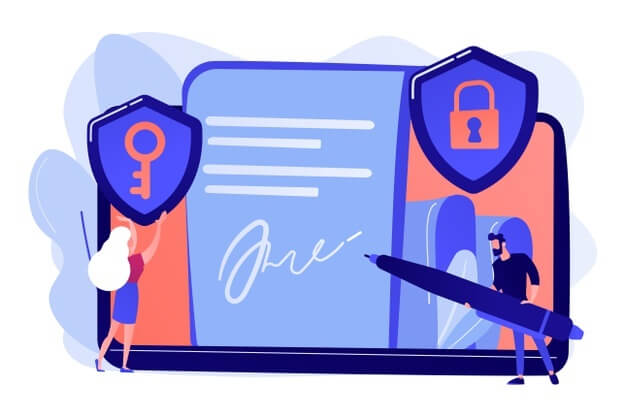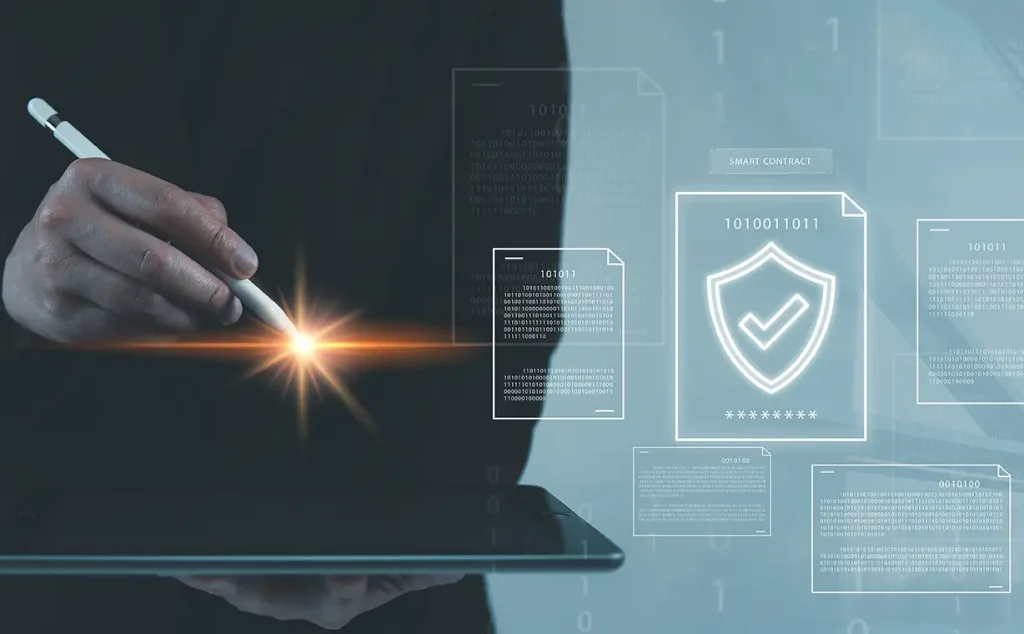This article takes a deep dive into digital signature vs digital certificate to better understand the benefits of adopting Viafirma eSignature solutions for business operations.
Some people believe both concepts are the same. Indeed they are used for e-signing electronic documentation but each one has a particular scenario. Let’s learn more about them!
What are digital certificates
It is extremely important to stay up to date with the world of technology, specially with trends that can have a positive impact on a company’s performance and efficiency.
A digital certificate is a digital document containing a dataset to identify a person via the Internet. The European Commission defines “certificate for electronic signature” in eIDAS regulation as follows:
”An electronic attestation which links electronic signature validation data to a natural person and confirms at least the name or the pseudonym of that person”
Digital certificates have become key for communicating with the private sector and, above all, with the Public Administration, which has enabled to carry out Administrative Procedures from any computer or mobile device.
Using digital certificates to sign documents
Personal digital certificates are issued by Trust Service Providers to ensure the signer matches their digital identity. They can be used to eSign any type electronic contract with full legal guarantees.
When a digital certificate is granted to others, TSP or CAs are able to provide the following security benefits:
- Personal information to uniquely identify the owner
- Information necessary for identification and communication with the authority that issued the document
- Designed resistant to cracking and counterfeiting;
- Issued by a body that can revoke an identification card at any time (for example, if the card is used for other purposes or lost);
- It may be checked for authenticity after contacting the issuing authority

The main difference between digital certificate vs digital signature is that the first one helps verifying the identity of the sender, while the latter is used for validating the data sent.
What are digital signatures
Here’s the explanation of what are digital signatures:
“A mathematical scheme for verifying the authenticity of digital messages or documents. A valid digital signature, where the prerequisites are satisfied, gives a recipient very strong reason to believe that the message was created by a known sender (authentication), and that the message was not altered in transit (integrity)
https://en.wikipedia.org/wiki/Digital_signature
Therefore, there are three basic features in a digital signature: authentication, non-repudiation and integrity.
Authentication refers to the identification of the original signer. Non-repudiation means that signers can’t deny that they have signed the document. Finally, integrity shows that the signature has not been altered after it was first issued.
A few years ago, the European Union introduced a law to regulate electronic signatures as well as the features they must have in order to be legally valid.
Regulation EU 910/2014 sets out three types of eSignatures:
- Simple electronic signature: Simple electronic signature means data in electronic form which is attached to or logically associated with other data in electronic form and which is used by the signatory to sign. It has legal effect and can hold up in a court of law, although it may have to be backed with other type of evidence.
- Advanced electronic signature: A signature that is uniquely linked to the signatory, allowing their identification. Created using signature creation data that only the signatory can use, with a high level of confidence, under their exclusive control and linked to the data signed by them so that any possible further changes are detected. This type of signature certifies the identity of the signatory, integrity of data, providing more legal guarantees.
- Qualified electronic signature: It is an advanced electronic signature created using a qualified electronic signature creation device and based on a qualified certificate. It enjoys the highest possible level of security and will have a legal effect similar to the handwritten signature.
In other words:
- There are many ways to sign electronically. If they meet the established requirements, they can be considered advanced electronic signatures, which are perfectly secure and recognized by the European legislation.
- In case a qualified digital certificate is used (under certain specific conditions) it will have the same legal effect as the handwritten signature.
Which one should I use?
If you wish to automate your company’s agreement process and close deals faster on a regular basis, it is advisable to incorporate digital signature software such as those offered by Viafirma. Our software allows companies to approve, sign and send documents for signature anytime, at any place.
Nonetheless, if what you need is to sign some documents from time to time we suggest to use your personal or corporate digital certificate.
In short, digital signatures and digital certificate are not exactly the same, although they are often used as synonyms. The former is a useful tool to streamline the company’s processes while saving time and money, while the latter is simply the digital object that allows the identification of a person via the Internet
Viafirma: Legally binding eSignatures for your business
Viafirma cover all above-mentioned signature options. Furthermore, they offer legal evidence to add an extra layer of security to the signed documents (e.g., location, timestamping, SMS or email OTP signature, etc.), as well as the possibility to eSign wherever, on any device.
These tools are extremely useful to achieve digital transformation successfully. Many companies are now taking steps to digitize their business and mobility in the work system to adapt to new market trends.
Viafirma Suite uses the universal signature to strengthen mobility, accepting the principles of technology neutrality. They can be used anywhere, on any device or operating system. Therefore, there is no need to waste money on specific servers or changing operating system. Furthermore, it does not require complex setups, as this tool that can be easily installed or integrated into any company that intends to modernize their work system.
eSignatures can be used in many areas of a business. Not only simplifies life and accelerates business, adopting a paperless working system also results in greater organization, preventing paperwork from being misplaced or lost by accident. Therefore, the use of digital technology helps keeping everything more classified while avoiding the possibility of losing things thanks to the cloud storage.
